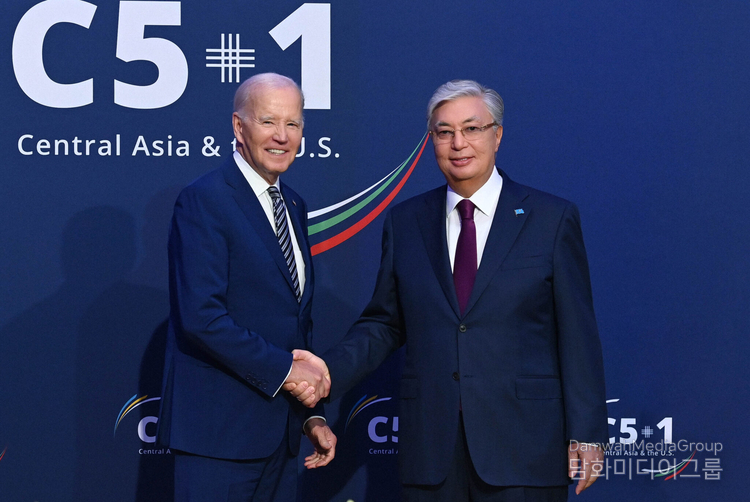By Diplomacy Journal Lee Kap-soo
The following article was contributed by the Embassy of Kazakhstan in Seoul to Diplomacy Journal for publication. __ Ed.
Since gaining sovereignty, Kazakhstan has navigated a complex international landscape with a foreign policy strategy rooted in pragmatism and proactive engagement. Embracing a multi-vector approach, the nation has become a pivotal player in shaping global and regional agendas while steadfastly defending its national interests. This approach has not only bolstered Kazakhstan's standing on the world stage, but has also fostered cooperation and stability in Eurasia and beyond.

1. Foundations of Sovereignty. The origin of Kazakhstan's foreign policy lies in the imperative to assert its sovereignty and align its strategic interests with the realities of the modern world. Central to this endeavor is the unwavering commitment to the principles of the UN Charter and the promotion of territorial integrity among all states.
2. Multi-Vector Diplomacy. Kazakhstan's foreign policy is characterized by its multi-vector diplomacy, which seeks to balance relationships with major global powers while nurturing ties with neighboring states and regional organizations. This approach has enabled Kazakhstan to actively participate in international forums and initiatives, influencing global discourse on issues ranging from security to sustainable development.
3. Leadership in Multilateral Organizations. Kazakhstan's leadership roles in prestigious international organizations underscore its commitment to multilateral diplomacy. Presiding over bodies such as the Shanghai Cooperation Organization (SCO), the Collective Security Treaty Organization (CSTO), and Conference on Interaction and Confidence-Building Measures in Asia (CICA), Kazakhstan contributes to shaping regional security architectures and promoting cooperation among member states.
4. United Nations Engagement. Kazakhstan's active engagement within the United Nations exemplifies its dedication to global peace and security. From serving as a non-permanent member of the UN Security Council to championing initiatives in nuclear disarmament and climate action, Kazakhstan has demonstrated its resolve to address pressing global challenges through multilateral cooperation.
5. Regional Cooperation. Central to Kazakhstan's foreign policy is the promotion of regional cooperation, particularly within Central Asia. Through platforms like the Consultative Meeting of the Heads of State of Central Asia and the CA+ format, Kazakhstan works closely with neighboring countries to enhance security, stability, and economic integration in the region. Kazakhstan enjoys productive cooperation with Korea bilaterally as well as within C5+K format.
6. Mediator and Peacemaker. Kazakhstan's reputation as a mediator in international conflicts underscores its commitment to promoting peace and dialogue. Initiatives such as the Astana process for the Syrian settlement demonstrate Kazakhstan's willingness to facilitate negotiations and find peaceful solutions to complex geopolitical challenges.
7. Religious Tolerance and Interfaith Dialogue. Kazakhstan's hosting of the Congress of Leaders of World and Traditional Religions exemplifies its commitment to religious tolerance and interfaith dialogue. By providing a platform for representatives of diverse faiths to come together, Kazakhstan promotes mutual understanding and harmony on a global scale. Korea’s Jogye Order of Korean Buddhism actively participates in the Congress and contributes to its deliberations.
8. Economic Diplomacy. Kazakhstan's economic diplomacy focuses on attracting foreign investment and promoting trade partnerships. The country's strategic location as a transit hub and its participation in initiatives like Middle Corridor development position it as a key player in regional and global trade networks. Today, Korea emerged as 4th largest trade partner (1. China 2. Italy 3. Russia) and the 5th biggest foreign investor (1. Netherlands 2. Russia 3. Switzerland 4. China) for Kazakhstan. In March 20-21, 2024, civil aviation authorities agreed to increase the current 10 flights per week between Almaty-Seoul to 40 flights per week.
9. Technological Innovation and Sustainability. Kazakhstan's efforts to transition to green energy and embrace technological innovation reflect its commitment to sustainable development. Projects such as the production of green hydrogen and the construction of wind farms underscore Kazakhstan's proactive approach to addressing environmental challenges while promoting economic growth. Kazakhstan has recently joined the Global Methane Pledge and continues to cooperate with GGGI, AFoCO and GCF to advance goals of green and sustainable development.
10. Financial Hub and Investment Destination. The Astana International Financial Centre serves as a testament to Kazakhstan's aspirations to become a global financial hub. By offering favorable business conditions and attracting investment from around the world, Kazakhstan aims to drive economic growth and diversification. In February 2024, Governor of the National Bank of Kazakhstan Timur Suleimenov and Chairperson of the Agency for Regulation and Development of Financial Market of Kazakhstan Madina Abylkassymova met with the leadership of the Financial Supervisory Service (FSS), Financial Services Commission (FSC), Bank of Korea, Shinhan Bank, BNK Capital and explored opportunities for financial cooperation.
In conclusion, Kazakhstan's multi-vector foreign policy has proven instrumental in advancing its national interests while fostering cooperation and stability in Eurasia and beyond. By embracing diplomacy, mediation, and sustainable development, Kazakhstan as a middle power continues to play a pivotal role in shaping the future of the region and the world. In this context, Kazakhstan’s cooperation with Korea is bound to expand even further, as the economic realities are such that their commercial interests are complimentary and the two countries enjoy enhanced strategic partnership.







